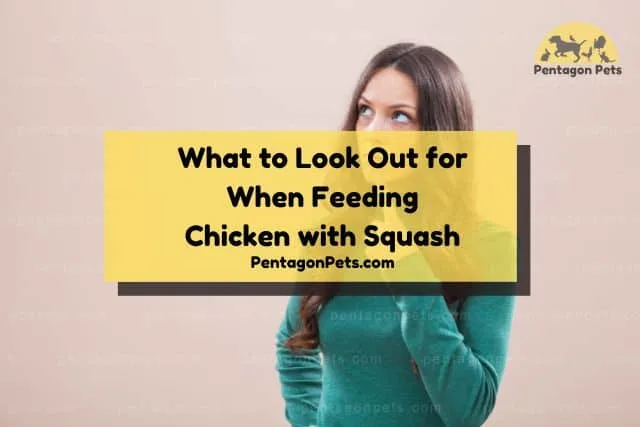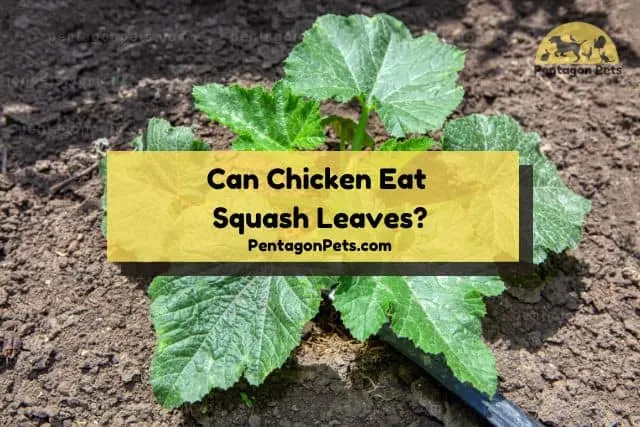If you are raising chickens, you probably wonder which items you can feed them safely, and which ones you should avoid. Many people ask whether or not squash is safe to feed chickens since this common fruit is found both intentionally grown on farms and grown in the wild.
Chickens can safely eat squash, which offers nutritional benefits including vitamins, minerals, and fiber. It can be served to chickens either raw or cooked, with seeds included, adding valuable variety to their diet. However, it’s crucial to avoid feeding them spoiled squash to prevent health complications.
Squash is a great addition to a chicken’s diet. It’s packed with essential nutrients like vitamins A and C, minerals, and fiber, which are beneficial for their overall health.
You can feed squash to chickens in various forms – raw, cooked, or even roasted. Including the seeds is fine, as they can act as a natural dewormer.

It’s important to cut the squash into manageable pieces to make it easier for the chickens to eat. Offering different types of squash can also provide dietary variety, which is important for their well-being.
However, there are a few things to keep in mind. Ensure that the squash is fresh and not spoiled, as rotten vegetables can harbor harmful bacteria and toxins.
Also, while squash is healthy, it should not replace their primary food source. Chickens need a balanced diet comprising grains, greens, and protein sources like insects and worms. Squash should be given as a supplement to this diet.
Additionally, observe your chickens for any adverse reactions when introducing new foods like squash, as individual chickens may have different tolerances and preferences.

Feeding squash to chickens is perfectly safe, but make sure you rinse the squash thoroughly if you’re feeding them store-bought produce to remove any chemicals and pesticides. Peel the squash so that the tough outer skin won’t harm their beaks when they peck at it.
Overall, squash is a healthy, delicious treat for chickens that is full of vitamins and nutrients that will help to keep your flock happy and healthy if it’s served as part of a balanced diet.
Your chicken should have squash as a treat only, and it should not be the main part of their daily diet. Some farmers even believe that squash is a natural dewormer, which means that it provides your chickens with even more natural health benefits.
Some chickens enjoy eating squash, while others might not be a fan of this unusual gourd. Chickens may also eat the leaves and seeds, but most birds seem to be partial to the flesh inside rather than the leaves, so it’s something to keep in mind.
Mix things up by adding pumpkin and other melons to provide your chickens with a delicious, healthy treat they can enjoy occasionally.
What to Look Out for When Feeding Chicken with Squash

Squash may be eaten fresh or cooked when you give it to your chickens, but the skin may be tough on their tender beaks, so it’s best to remove the skin before serving it to them.
If you do serve raw squash to chickens, try chopping it up into smaller pieces and removing the seeds. The hens will enjoy eating the squash seeds later or you can mix them in with your normal chicken feed for added flavor and texture.
Always rinse the squash thoroughly before serving it to your chickens and make sure that it only makes up approximately 10% of their diet. While squash is rich in nutrients, it doesn’t have all of the vitamins and minerals that chickens require to be healthy and robust.
If you’re giving squash to chicks (baby chickens), cook it first until it’s at a soft consistency. You can mash the squash up like baby food, which will not only make it easier for chicks to eat but also easier for them to digest.
Store uneaten, uncut squash in the fridge at 55 degrees Fahrenheit or lower so that it stays fresh until you’re ready to serve it, and never give chickens rotten or overripe squash.
Can Chicken Eat Squash Leaves?

Chickens may eat the leaves of squash, although most birds aren’t a fan of this part of the gourd. If you want to feed your chickens squash leaves, consider chopping them up and adding them to their feed rather than giving it to them individually. The leaves aren’t usually as popular as the actual squash itself, but it won’t hurt them.
It is safe for chickens to eat squash leaves, but they shouldn’t be the main part of their diets. Most chickens tend to favor the seeds and the fruit of the squash rather than the leaves, but it won’t hurt to include them as part of the treat if you want to.
This article was first published on November 15, 2022 by Pentagon-Pets.
There are some leaves that chickens should always avoid eating since they contain harmful toxins that could make your birds sick or even cause death.
Leaves to avoid include tomato, pepper, and potato leaves which contain toxins that are dangerous not just to chickens, but to many other animals, too.
Instead, give your chickens squash leaves, lettuce, kale, chard, or turnip greens if you want to feed them leaves.
Can Chicken Eat Squash Seeds?
Squash seeds and other seeds have long been a key part of animal diets, including farm animals like chickens. Give your chickens squash seeds every so often as a treat or feed them to your birds for one week during the fall and in early spring to help prevent worms. Some people claim that the seeds of the squash plant contain ingredients that serve as a natural dewormer, so giving them squash seeds as a supplement is often recommended.
Yes, chickens can eat squash seeds safely as long as they’re fed in moderation. Give your chickens squash seeds mixed in with their feed or as a special treat every so often to help prevent worms and to enrich their diets.
Can Chicken Eat Squash Stems/Plants?

Chickens may eat the stems and plant portions of squash in addition to the seeds. While squash seeds have the densest amount of nutrients, stems are perfectly fine to feed your chickens if they enjoy eating them. Some chickens won’t be interested in the stems, but you can add them to their treats to enhance their daily nutrient intake.
Yes, chickens can eat squash stems and plants, but the amount of nutrients this part of the plant contains depends on the variety of squash and the maturity of the fruit. Mature winter squash stems tend to have more nutrients than spring or summer squash stems.
Can Chicken Eat Squash Blossoms/Flowers?
As a general rule, chickens can eat virtually all parts of the squash, even the blossoms and flowers. These flowers are a great treat to give your chickens, and most birds enjoy eating them fresh off the vine. Remember that squash blossoms are only to be given as treats and shouldn’t make up over 10 percent of their diet.
Yes, chickens may eat squash blossoms and flowers. This part of the plant is actually rich in healthy nutrients like calcium, iron, and vitamin A and makes a delicious, healthy snack or treat.
Can Chicken Eat Squash Skin?

While chickens can eat squash skin, it’s not recommended that you feed it to them if you can avoid it, or cook the whole squash first to soften the skin. Most squash varieties have thick, tough skin that can be hard on the birds’ beaks. It won’t necessarily harm your chickens if they eat it, but removing the skin will make the squash easier and more pleasant to eat and can help to avoid potential injuries.
Pentagon Pet is the owner of this article that was first published on November 15, 2022.
Chickens can eat squash skin but it’s best to remove it before feeding the plant to them. Squash skin is hard and tough and could injure the chicken’s beak. Peel the skin off of the squash and cut it into pieces before feeding it to your chickens whenever possible.
Related Articles
Can Chicken Eat Pecan? – Is It Safe?
Can Chicken Eat Flax – Is It Safe?
Can Chicken Eat Chia – Is It Safe?
Can Chicken Eat Cantaloupe – Is It Safe?
This article and its contents are owned by Pentagon Pets and was first published on November 15, 2022.
